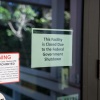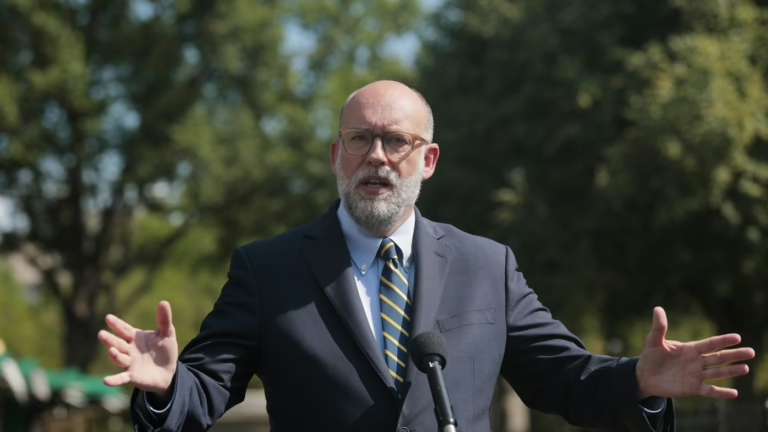Russell Vought, head of the Office of Management and Budget, speaks with the press outside the White House West Wing on July 17.
Anna Moneymaker/Getty Images
On Thursday, former President Trump announced plans to consult with his budget chief, Russ Vought, regarding which federal agencies led by Democrats should face budget cuts amid the ongoing government shutdown.
While federal operations are typically maintained by nonpartisan civil servants, with some agencies overseen by political appointees, the Trump administration is leveraging the shutdown to target Democratic-led departments.
Trump expressed on Truth Social his disbelief that “Radical Left Democrats” had handed him such a rare opportunity. He urged Republicans to capitalize on the shutdown to “remove ineffective elements” and claimed that billions could be saved by eradicating “waste and fraud,” though he did not specify any instances.
Though some observers view the administration’s threats as a strategic bluff aimed at pressuring Democrats back into negotiations, Vought, the Office of Management and Budget (OMB) director, appears to be following through on these warnings.
On Wednesday, Vought revealed plans to cancel $8 billion worth of energy initiatives and announced intentions to withhold $18 billion in infrastructure funds earmarked for New York City, a move that directly impacts the constituencies of Senate Minority Leader Chuck Schumer and House Democratic Leader Hakeem Jeffries.
Additionally, Vought has cautioned that federal employee layoffs could commence within days, although any such personnel reductions would need to be executed by individual agencies in accordance with established protocols.

House Speaker Mike Johnson (R-La.) defended Vought’s actions on Thursday, asserting that the OMB director is compelled to make difficult decisions under the president’s directive. Johnson blamed Senate Democrats for forcing the administration’s hand and emphasized that Vought’s role involves determining which policies, personnel, and programs are essential.
“Russ has to decide what is critical and what is not, a responsibility he does not relish,” Johnson said. “This situation could be resolved immediately if Senate Democrats return to negotiations. Otherwise, the consequences will only worsen.”
Limits of executive authority during a shutdown
Bridget Dooling, a law professor at The Ohio State University and former OMB official, clarified that a government shutdown does not grant Vought or the White House additional powers. She highlighted the distinction between a temporary funding lapse, which defines a shutdown, and permanent workforce reductions.
“This is essentially a negotiation tactic,” Dooling explained. “The administration is attempting to leverage the shutdown to compel Democrats back to the bargaining table and restore government operations.”
While the White House claims Democrats have left no alternative but to seek savings across federal agencies, it has yet to justify why permanent layoffs are necessary instead of temporary furloughs.
Vought’s previous statements suggest his focus is less on bipartisan cooperation and more on advancing long-standing conservative reforms.
Vought’s history of advocating for stringent budget cuts
As a principal architect of Project 2025, a conservative blueprint unveiled in 2023 for a prospective Republican administration, Vought championed a proactive approach to reducing federal spending and restructuring the civil service.
Now serving within the administration, he is actively implementing these objectives.
Vought has asserted that with Republicans controlling the federal government, it is imperative to curb expenditures regardless of Democratic support.
“The appropriations process must become less bipartisan,” he stated during a Christian Science Monitor breakfast this summer.
On Fox Business this past Tuesday, Vought described the shutdown as an opportunity to advance the administration’s agenda of downsizing the federal workforce.
“There are numerous authorities available to ensure this administration’s policies continue, including reducing the federal government’s size and scope,” he said.
Last week, Vought circulated a memo instructing federal agencies to prepare for significant workforce reductions should the shutdown persist.
This directive sparked outrage among Democratic leaders.
House Democratic Leader Hakeem Jeffries condemned the threats, declaring on X that Vought is a “malignant political operative” and vowed that Democrats would not be intimidated by the prospect of mass firings.
Republican congressional leaders argue that Democrats’ refusal to negotiate has effectively ceded budgetary control to the executive branch.
Typically, during a shutdown, agencies classify employees as “essential” or “nonessential” for temporary furloughs. However, the White House appears to be using this framework to justify permanent cuts.
Democrats on Capitol Hill criticize Vought’s tactics
Many Democrats contend that Vought’s current actions mirror his approach since the administration began, fueling their resolve to resist.
“This is a troubling sign of democratic erosion,” Senator Chris Murphy (D-Conn.) told NPR, referencing the cancellation of a wind energy project in his state, which is now subject to legal challenges.
Several Democrats accuse Vought and the president of exploiting the shutdown as a pretext to inflict political damage on their opponents.

Senator Tim Kaine (D-Va.) expressed concern over Vought’s targeting of Democratic-led states shortly after the shutdown began. He emphasized that any agreement to reopen the government must include enforceable measures ensuring funds are allocated as legislated.
“The critical issue is getting the president to honor agreements, rather than acting unilaterally to punish political adversaries,” Kaine said.
Kaine also noted that prior to the shutdown, the administration had already cut $40 million from an economic development project in Norfolk, Virginia, and rescinded $400 million in public health funding amid a measles outbreak.
Senate Majority Leader John Thune (R-S.D.) highlighted the need for at least five Democrats to join Republicans in passing a temporary funding bill to end the shutdown. So far, three senators-Democrats Catherine Cortez Masto (Nevada), John Fetterman (Pennsylvania), and Independent Angus King (Maine)-have supported the GOP proposal.
Cortez Masto explained her vote by citing concerns about Nevada’s economy, including tourism and military bases, stating she could not support a shutdown that would harm families and empower what she called a reckless administration.
Interestingly, when Vought shared a list of canceled energy projects in Democratic states, Nevada was notably absent, raising questions about whether Cortez Masto’s vote influenced that decision.
Senate Appropriations Chair Susan Collins (R-Maine) publicly opposed Vought’s unilateral budget cuts, advocating instead for bipartisan negotiations on individual spending bills.
Senator Mike Rounds (R-S.D.) defended Vought’s actions, asserting that the government shutdown provides a legitimate opportunity for the executive branch to reduce costs permanently. He urged Democrats to support a short-term funding measure if they wish to limit Vought’s authority.
However, Senator Murphy argued that as Vought pushes legal boundaries, Democrats must strengthen their resistance.
“We cannot accept a budget where funds are systematically withheld from Democratic states while favoring Republican ones. The more lawless these actions become, the firmer our resolve must be,” Murphy stated.
Labor unions push back against administration’s threats
Federal employee unions contend that the administration has overstepped its legal authority. Just before the shutdown, unions representing over 800,000 federal workers filed a lawsuit against Vought and Office of Personnel Management Director Scott Kupor, challenging what they describe as unlawful threats to dismantle critical federal services.
Everett Kelley, president of the American Federation of Government Employees (AFGE), called the administration’s actions “an illegal abuse of power aimed at punishing dedicated civil servants and pressuring Congress.”
AFGE and the American Federation of State, County and Municipal Employees argue that the OMB memo wrongly asserts that a lapse in appropriations nullifies agencies’ statutory obligations to execute programs previously funded by Congress.
The unions’ complaint seeks a judicial declaration that both OMB and OPM have exceeded their statutory authority, acted arbitrarily, and requests invalidation of any resulting actions from the memos and guidance issued.

















